Monsignor (1982)
 Character Name: Father John Flaherty
Character Name: Father John Flaherty
Reviewed by Judy Thomas
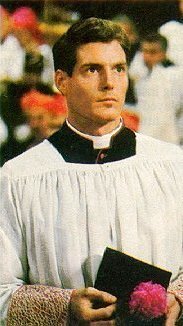 This motion picture has the look of an epic. Obviously a great deal of money was spent on it and, filmed on location in Italy, it is beautiful to look at. Based on a novel by Jack Alain Leger that was a bestseller in Europe, it was adapted for the screen by two veteran screenwriters. Monsignor's director, Frank Perry, did the acclaimed films David and Lisa, The Swimmer, and Diary of a Mad Housewife. The supporting cast is above reproach and includes a number of excellent performances by an international group of actors. The haunting musical score is by John Williams, no less. There is only one thing lacking in this film that seemingly has so much going for it and, it turns out, that missing element is crucial. Monsignor lacks credibility. Leonard Maltin calls it a "camp classic" (well, Perry also did Mommie Dearest) as it turns the Vatican into a collection of cardinals, bishops and flunkies jockeying for power. Roger Ebert says that Monsignor is "most cynical film ever made about organized religion." I mostly think of it as a strange movie - also a bit sad that the filmmakers did not put the considerable assets at their disposal to better use.
This motion picture has the look of an epic. Obviously a great deal of money was spent on it and, filmed on location in Italy, it is beautiful to look at. Based on a novel by Jack Alain Leger that was a bestseller in Europe, it was adapted for the screen by two veteran screenwriters. Monsignor's director, Frank Perry, did the acclaimed films David and Lisa, The Swimmer, and Diary of a Mad Housewife. The supporting cast is above reproach and includes a number of excellent performances by an international group of actors. The haunting musical score is by John Williams, no less. There is only one thing lacking in this film that seemingly has so much going for it and, it turns out, that missing element is crucial. Monsignor lacks credibility. Leonard Maltin calls it a "camp classic" (well, Perry also did Mommie Dearest) as it turns the Vatican into a collection of cardinals, bishops and flunkies jockeying for power. Roger Ebert says that Monsignor is "most cynical film ever made about organized religion." I mostly think of it as a strange movie - also a bit sad that the filmmakers did not put the considerable assets at their disposal to better use.
The story begins with a compelling scene as Christopher Reeve is being ordained as a young Roman Catholic priest. World War II is raging and Reeve's character, John Flaherty, immediately volunteers to be an army chaplain. Thrust into the heat of battle, Flaherty is overwhelmed by "dead men everywhere" as he commandeers a machine gun and opens fire on the Germans, starting a counterattack by the allies. "Thou shalt not kill" is but the first of many commandments that Father Flaherty will violate during 122 minutes as the filmmakers pile on one shocking incident after another.
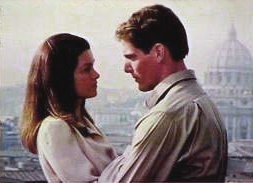 Flaherty's transgression lands him not in hot water but in the Vatican, where he becomes a rising star under the tutelage of a cardinal from Boston who wants the young Irish-American cleric to succeed in this "Italian monopoly". He succeeds alright: Concealing that he is a priest, Flaherty seduces a postulant nun, Clara, played by Genevieve Bujold. Meanwhile, in his role as the Vatican's business manager, he persuades the secretary of state, Cardinal Santoni (Fernando Rey) to let the Vatican commissary buy goods like American cigarettes at a low price and sell them to the Mafia-controlled black market in order to solve the Church's cash flow problems. Did the Vatican actually engage in such dealings during the War or is this but one more cynical plot device? The film's producer, Frank Yablans, would only say that he considered that "dramatically interesting" and the numerous moral dilemmas raised here are either avoided or hopelessly trivialized as Flaherty inexorably rises in the Church hierarchy.
Flaherty's transgression lands him not in hot water but in the Vatican, where he becomes a rising star under the tutelage of a cardinal from Boston who wants the young Irish-American cleric to succeed in this "Italian monopoly". He succeeds alright: Concealing that he is a priest, Flaherty seduces a postulant nun, Clara, played by Genevieve Bujold. Meanwhile, in his role as the Vatican's business manager, he persuades the secretary of state, Cardinal Santoni (Fernando Rey) to let the Vatican commissary buy goods like American cigarettes at a low price and sell them to the Mafia-controlled black market in order to solve the Church's cash flow problems. Did the Vatican actually engage in such dealings during the War or is this but one more cynical plot device? The film's producer, Frank Yablans, would only say that he considered that "dramatically interesting" and the numerous moral dilemmas raised here are either avoided or hopelessly trivialized as Flaherty inexorably rises in the Church hierarchy.
I have two favorite scenes in this film, though unfortunately both also illustrate what is wrong with it. In the first, hundreds of people are assembled in a huge ornate room as the priests and nuns line up to be presented to the Pope. John William's neo-liturgical score adds to the majesty of it all. Flaherty is seated with the other priests when he notices that Clara will be walking right past him - surely discovering his identity. His panic builds as she comes closer. When the moment of truth arrives and Clara discovers that her mysterious lover is A PRIEST, she stops dead in her tracks and the other nuns bunch up behind her. The scene is well acted and is described by critic, Joyce Persico as follows: "Reeve at first avoids her stare and then abruptly swings his face towards her to meet her eyes. His acute embarrassment is mirrored in his eyes, eyes ringed with tears and humiliation. When she refuses to stop staring at him, his whole body seems to collapse and the humiliation turns to begging." It is high drama; but it's also a struggle by this point in the film to take something like this seriously.
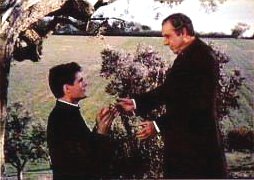 In another beautiful scene shortly afterward, Flaherty is helping his sponsor Santoni pick olives in an ancient grove near the sea and Williams's music again swells in the background as Flaherty questions whether he is really meant to be a priest. "Everyone transgresses without end. It's the very nature of our existence," says the kindly Santoni as Flaherty kneals before him. The young priest's eyes glisten and his face has the look of a man who has learned his lesson. It is so moving that we are tempted to think this film is going somewhere after all. But our hopes are quickly dashed as the movie fast-forwards a couple of decades and the now grey-haired Flaherty is wheeling and dealing as usual. This time hundreds of millions of the Church's dollars have been lost in reckless stock-market speculation by Flaherty's childhood pal and front man, Varese, who is on the run in America having cheated both Flaherty and their mutual friend - a ruthless mob boss with a soft spot for the Church.
In another beautiful scene shortly afterward, Flaherty is helping his sponsor Santoni pick olives in an ancient grove near the sea and Williams's music again swells in the background as Flaherty questions whether he is really meant to be a priest. "Everyone transgresses without end. It's the very nature of our existence," says the kindly Santoni as Flaherty kneals before him. The young priest's eyes glisten and his face has the look of a man who has learned his lesson. It is so moving that we are tempted to think this film is going somewhere after all. But our hopes are quickly dashed as the movie fast-forwards a couple of decades and the now grey-haired Flaherty is wheeling and dealing as usual. This time hundreds of millions of the Church's dollars have been lost in reckless stock-market speculation by Flaherty's childhood pal and front man, Varese, who is on the run in America having cheated both Flaherty and their mutual friend - a ruthless mob boss with a soft spot for the Church.
Monsignor was filmed in 1982 at a time when Reeve was thoroughly fed up with Superman jokes and with prying into his private life. It doesn't help that part of his vestments in Monsignor is something that looks like a black cape. Reeve was enthusiastic about the part saying: "I thought the chance to play a morally ambiguous character who was neither clearly good nor clearly bad, someone to whom life is much more complex than the characters I've played previously would be good." As is typical of him, Reeve worked hard to prepare for the part. A self-described lapsed Episcopalian, he spent six weeks with the Paulist Fathers in New York, studying them for the role of Father Flaherty. A decade later Reeve would again use the knowledge he gained here when he played a priest in the less pretentious, but ultimately more satisfying, television movie, Mortal Sins. Before his injury there was even talk that the producers of The Thorn Birds wanted him to take over the Richard Chamberlain role in the Missing Years sequel (a part that Chamberlain eventually played).
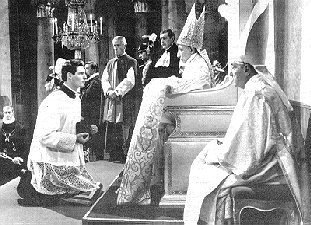 Reeve dutifully made the rounds to promote Monsignor and it opened in wide release after 20th Century-Fox spent $6 million on a media blitz in October, 1982. Reviews were overwhelmingly negative and the film didn't last long in theaters. It was a bitter lesson about Hollywood-style filmmaking for Reeve who, years later, had these comments about it: "Monsignor should have been a good movie, and it just went off the track for reasons that I don't want to embarrass a lot of people by discussing. The way it was released, the movie is sort of a series of outrageous incidents that you find hard to believe. Since they don't have a focus, and since they aren't justified and explained, they become laughable." He later added in an interview with Gene Shalit: "Instead of fixing the film, they sold it up the Wazoo - full page ads in the Times. That's not filmmaking. That's just not filmmaking." It is perhaps significant that for his next motion picture, after Superman III, Reeve turned down $1,000,000. to star in Hollywood's The Bounty and accepted one tenth that amount in order to work with the esteemed Merchant-Ivory team in The Bostonians.
Reeve dutifully made the rounds to promote Monsignor and it opened in wide release after 20th Century-Fox spent $6 million on a media blitz in October, 1982. Reviews were overwhelmingly negative and the film didn't last long in theaters. It was a bitter lesson about Hollywood-style filmmaking for Reeve who, years later, had these comments about it: "Monsignor should have been a good movie, and it just went off the track for reasons that I don't want to embarrass a lot of people by discussing. The way it was released, the movie is sort of a series of outrageous incidents that you find hard to believe. Since they don't have a focus, and since they aren't justified and explained, they become laughable." He later added in an interview with Gene Shalit: "Instead of fixing the film, they sold it up the Wazoo - full page ads in the Times. That's not filmmaking. That's just not filmmaking." It is perhaps significant that for his next motion picture, after Superman III, Reeve turned down $1,000,000. to star in Hollywood's The Bounty and accepted one tenth that amount in order to work with the esteemed Merchant-Ivory team in The Bostonians.
Monsignor shows up from time to time on television and there is a video available. Anyone trying to enjoy it should be willing to suspend a lot of disbelief as they watch what has to be one of the most frustrating films for Reeve fans - frustrating because in the right hands this could have been an absorbing behind-the-scenes look at the Vatican as well as a great motion picture.
REVIEWS
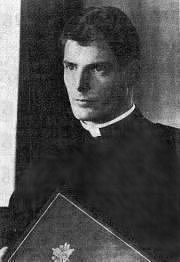 Not even Chris Reeve can save this film. Monsignor is as cold and impenetrable as marble in spite of Reeve's efforts to redeem its sins. Joyce Persico, Trenton Times.
Not even Chris Reeve can save this film. Monsignor is as cold and impenetrable as marble in spite of Reeve's efforts to redeem its sins. Joyce Persico, Trenton Times.
Poor Reeve can't get away from these concealed-identity roles, but if he's not careful his identity as an actor is going to be permanently concealed. Only his best friend or his best accountant can explain why the talented Reeve signed on for this ecclesiastical geek of a movie, which wins the "Inchon" Award as Most Gangrenous Turkey of the Month. Jack Kroll, Newsweek, November 8, 1982
Reeve maintains the same suave smile throughout, perfect for the Man of Steel, not for a man of faith committing mortal sins right and left. His apparent aplomb generates no drama. Robert Asahina, The New Leader, November 29, 1982
Because of the dumbness of what is in the script and the importance of what has been omitted, Reeve finds himself in a vacuum as much as in the Vatican.... In donning the cassock for Monsignor, he is required to be utterly serious and give voice to the kind of lines that leave an actor absolutely defenseless.... (Reeve's) special gift is for light comedy and his contributions to the two Superman films have been rather underrated. Outside of Superman, Reeve has proved in Deathtrap and Somewhere in Time that he will have plenty to do after he hangs up his cape. Desmond Ryan, Philadelphia Inquirer
Back to the top


News Reports | Biography | Fundraising | Online Shop | Autobiography
Movie Reviews | Contact Info | Have Your Say | Photo Gallery | Song Lyrics
Transcripts | Mailing Lists | Interviews | Other Websites | About Us | Search
This page is Copyright © 1999-2014, Steven Younis. All Rights Reserved
Jump to Steven Younis' unofficial Superman Homepage
|

 This motion picture has the look of an epic. Obviously a great deal of money was spent on it and, filmed on location in Italy, it is beautiful to look at. Based on a novel by Jack Alain Leger that was a bestseller in Europe, it was adapted for the screen by two veteran screenwriters. Monsignor's director, Frank Perry, did the acclaimed films David and Lisa, The Swimmer, and Diary of a Mad Housewife. The supporting cast is above reproach and includes a number of excellent performances by an international group of actors. The haunting musical score is by John Williams, no less. There is only one thing lacking in this film that seemingly has so much going for it and, it turns out, that missing element is crucial. Monsignor lacks credibility. Leonard Maltin calls it a "camp classic" (well, Perry also did Mommie Dearest) as it turns the Vatican into a collection of cardinals, bishops and flunkies jockeying for power. Roger Ebert says that Monsignor is "most cynical film ever made about organized religion." I mostly think of it as a strange movie - also a bit sad that the filmmakers did not put the considerable assets at their disposal to better use.
This motion picture has the look of an epic. Obviously a great deal of money was spent on it and, filmed on location in Italy, it is beautiful to look at. Based on a novel by Jack Alain Leger that was a bestseller in Europe, it was adapted for the screen by two veteran screenwriters. Monsignor's director, Frank Perry, did the acclaimed films David and Lisa, The Swimmer, and Diary of a Mad Housewife. The supporting cast is above reproach and includes a number of excellent performances by an international group of actors. The haunting musical score is by John Williams, no less. There is only one thing lacking in this film that seemingly has so much going for it and, it turns out, that missing element is crucial. Monsignor lacks credibility. Leonard Maltin calls it a "camp classic" (well, Perry also did Mommie Dearest) as it turns the Vatican into a collection of cardinals, bishops and flunkies jockeying for power. Roger Ebert says that Monsignor is "most cynical film ever made about organized religion." I mostly think of it as a strange movie - also a bit sad that the filmmakers did not put the considerable assets at their disposal to better use. Flaherty's transgression lands him not in hot water but in the Vatican, where he becomes a rising star under the tutelage of a cardinal from Boston who wants the young Irish-American cleric to succeed in this "Italian monopoly". He succeeds alright: Concealing that he is a priest, Flaherty seduces a postulant nun, Clara, played by Genevieve Bujold. Meanwhile, in his role as the Vatican's business manager, he persuades the secretary of state, Cardinal Santoni (Fernando Rey) to let the Vatican commissary buy goods like American cigarettes at a low price and sell them to the Mafia-controlled black market in order to solve the Church's cash flow problems. Did the Vatican actually engage in such dealings during the War or is this but one more cynical plot device? The film's producer, Frank Yablans, would only say that he considered that "dramatically interesting" and the numerous moral dilemmas raised here are either avoided or hopelessly trivialized as Flaherty inexorably rises in the Church hierarchy.
Flaherty's transgression lands him not in hot water but in the Vatican, where he becomes a rising star under the tutelage of a cardinal from Boston who wants the young Irish-American cleric to succeed in this "Italian monopoly". He succeeds alright: Concealing that he is a priest, Flaherty seduces a postulant nun, Clara, played by Genevieve Bujold. Meanwhile, in his role as the Vatican's business manager, he persuades the secretary of state, Cardinal Santoni (Fernando Rey) to let the Vatican commissary buy goods like American cigarettes at a low price and sell them to the Mafia-controlled black market in order to solve the Church's cash flow problems. Did the Vatican actually engage in such dealings during the War or is this but one more cynical plot device? The film's producer, Frank Yablans, would only say that he considered that "dramatically interesting" and the numerous moral dilemmas raised here are either avoided or hopelessly trivialized as Flaherty inexorably rises in the Church hierarchy. In another beautiful scene shortly afterward, Flaherty is helping his sponsor Santoni pick olives in an ancient grove near the sea and Williams's music again swells in the background as Flaherty questions whether he is really meant to be a priest. "Everyone transgresses without end. It's the very nature of our existence," says the kindly Santoni as Flaherty kneals before him. The young priest's eyes glisten and his face has the look of a man who has learned his lesson. It is so moving that we are tempted to think this film is going somewhere after all. But our hopes are quickly dashed as the movie fast-forwards a couple of decades and the now grey-haired Flaherty is wheeling and dealing as usual. This time hundreds of millions of the Church's dollars have been lost in reckless stock-market speculation by Flaherty's childhood pal and front man, Varese, who is on the run in America having cheated both Flaherty and their mutual friend - a ruthless mob boss with a soft spot for the Church.
In another beautiful scene shortly afterward, Flaherty is helping his sponsor Santoni pick olives in an ancient grove near the sea and Williams's music again swells in the background as Flaherty questions whether he is really meant to be a priest. "Everyone transgresses without end. It's the very nature of our existence," says the kindly Santoni as Flaherty kneals before him. The young priest's eyes glisten and his face has the look of a man who has learned his lesson. It is so moving that we are tempted to think this film is going somewhere after all. But our hopes are quickly dashed as the movie fast-forwards a couple of decades and the now grey-haired Flaherty is wheeling and dealing as usual. This time hundreds of millions of the Church's dollars have been lost in reckless stock-market speculation by Flaherty's childhood pal and front man, Varese, who is on the run in America having cheated both Flaherty and their mutual friend - a ruthless mob boss with a soft spot for the Church. Reeve dutifully made the rounds to promote Monsignor and it opened in wide release after 20th Century-Fox spent $6 million on a media blitz in October, 1982. Reviews were overwhelmingly negative and the film didn't last long in theaters. It was a bitter lesson about Hollywood-style filmmaking for Reeve who, years later, had these comments about it: "Monsignor should have been a good movie, and it just went off the track for reasons that I don't want to embarrass a lot of people by discussing. The way it was released, the movie is sort of a series of outrageous incidents that you find hard to believe. Since they don't have a focus, and since they aren't justified and explained, they become laughable." He later added in an interview with Gene Shalit: "Instead of fixing the film, they sold it up the Wazoo - full page ads in the Times. That's not filmmaking. That's just not filmmaking." It is perhaps significant that for his next motion picture, after Superman III, Reeve turned down $1,000,000. to star in Hollywood's The Bounty and accepted one tenth that amount in order to work with the esteemed Merchant-Ivory team in The Bostonians.
Reeve dutifully made the rounds to promote Monsignor and it opened in wide release after 20th Century-Fox spent $6 million on a media blitz in October, 1982. Reviews were overwhelmingly negative and the film didn't last long in theaters. It was a bitter lesson about Hollywood-style filmmaking for Reeve who, years later, had these comments about it: "Monsignor should have been a good movie, and it just went off the track for reasons that I don't want to embarrass a lot of people by discussing. The way it was released, the movie is sort of a series of outrageous incidents that you find hard to believe. Since they don't have a focus, and since they aren't justified and explained, they become laughable." He later added in an interview with Gene Shalit: "Instead of fixing the film, they sold it up the Wazoo - full page ads in the Times. That's not filmmaking. That's just not filmmaking." It is perhaps significant that for his next motion picture, after Superman III, Reeve turned down $1,000,000. to star in Hollywood's The Bounty and accepted one tenth that amount in order to work with the esteemed Merchant-Ivory team in The Bostonians. Not even Chris Reeve can save this film. Monsignor is as cold and impenetrable as marble in spite of Reeve's efforts to redeem its sins. Joyce Persico, Trenton Times.
Not even Chris Reeve can save this film. Monsignor is as cold and impenetrable as marble in spite of Reeve's efforts to redeem its sins. Joyce Persico, Trenton Times.